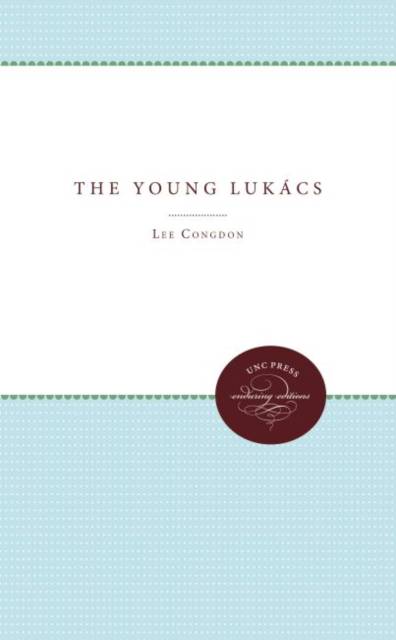
- Retrait gratuit dans votre magasin Club
- 7.000.000 titres dans notre catalogue
- Payer en toute sécurité
- Toujours un magasin près de chez vous
- Retrait gratuit dans votre magasin Club
- 7.000.0000 titres dans notre catalogue
- Payer en toute sécurité
- Toujours un magasin près de chez vous
Description
Based upon recently found manuscripts and correspondence, The Young Lukacs is the first comprehensive and fully researched portrait of Georg Lukacs to appear in any language. Lee Congdon finds in the young Lukacs's estrangement from his family and from Hungarian society roots for his continuing concern with the philosophic problem of alienation.
The chance discovery in 1972 of Lukacs's early manuscripts and correspondence has made possible an authoritative intellectual biography of this major Marxist thinker. Congdon has mined the wealth of material in the Lukacs Archives in Budapest and drawn upon Hungarian scholarship that is all but unknown in the West. The result is a biography that reveals the relationship between the ideas Lukacs entertained, the world in which he lived, and the conditions of his personal existence.
Congdon argues that Lukacs's understanding of Simmel, Dostoevski, and Hegel was profoundly affected by the world of fin de siecle Europe, the Great War, and the Russian Revolution. The evolution of Lukacs's own ideas, Congdon finds, was an expression of his relationships with three women -- Irma Siedler, Ljena Grabenko, and Gertrud Bortstieber. No one, writing in any language, has previously examined Lukacs's life and work in this context.
Although Congdon acknowledges some sympathy for the young Lukacs and his enthusiasms, he shows that the brilliant and sensitive thinker, in the words of Dostoevski, "started out with the idea of unrestricted freedom and . . . arrived at unrestricted despotism." The tragedy of Lukacs, he concludes, was that he hated injustice more than he loved human beings.
Originally published in 1983.
A UNC Press Enduring Edition -- UNC Press Enduring Editions use the latest in digital technology to make available again books from our distinguished backlist that were previously out of print. These editions are published unaltered from the original, and are presented in affordable paperback formats, bringing readers both historical and cultural value.
The chance discovery in 1972 of Lukacs's early manuscripts and correspondence has made possible an authoritative intellectual biography of this major Marxist thinker. Congdon has mined the wealth of material in the Lukacs Archives in Budapest and drawn upon Hungarian scholarship that is all but unknown in the West. The result is a biography that reveals the relationship between the ideas Lukacs entertained, the world in which he lived, and the conditions of his personal existence.
Congdon argues that Lukacs's understanding of Simmel, Dostoevski, and Hegel was profoundly affected by the world of fin de siecle Europe, the Great War, and the Russian Revolution. The evolution of Lukacs's own ideas, Congdon finds, was an expression of his relationships with three women -- Irma Siedler, Ljena Grabenko, and Gertrud Bortstieber. No one, writing in any language, has previously examined Lukacs's life and work in this context.
Although Congdon acknowledges some sympathy for the young Lukacs and his enthusiasms, he shows that the brilliant and sensitive thinker, in the words of Dostoevski, "started out with the idea of unrestricted freedom and . . . arrived at unrestricted despotism." The tragedy of Lukacs, he concludes, was that he hated injustice more than he loved human beings.
Originally published in 1983.
A UNC Press Enduring Edition -- UNC Press Enduring Editions use the latest in digital technology to make available again books from our distinguished backlist that were previously out of print. These editions are published unaltered from the original, and are presented in affordable paperback formats, bringing readers both historical and cultural value.
Spécifications
Parties prenantes
- Auteur(s) :
- Editeur:
Contenu
- Nombre de pages :
- 256
- Langue:
- Anglais
Caractéristiques
- EAN:
- 9780807865200
- Date de parution :
- 20-05-11
- Format:
- Livre broché
- Format numérique:
- Trade paperback (VS)
- Dimensions :
- 152 mm x 229 mm
- Poids :
- 381 g

Les avis
Nous publions uniquement les avis qui respectent les conditions requises. Consultez nos conditions pour les avis.






